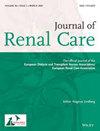Cultural Education Provided to Renal Staff Caring for First Nations People in Australia and Similarly Colonized Countries: A Scoping Review
Abstract
Background
First Nations People receive clinical care by renal staff who may or may not have had access to cultural education. If they have, what this education involves and if it has been co-designed with First Nations People is unknown.
Objective
Conduct a scoping review to examine the range and types of cultural education provided to clinical and professional (nonclinical) renal staff caring for First Nations People in Australia and similarly other colonized countries {Aotearoa/New Zealand (NZ), Canada, and North America}.
Design
Using the JBI methodology for scoping reviews a systematic search of 11 database (Australian Indigenous Health InfoNet, Scopus, APAIS-ATSIS (Informit), CINAHL (EBSCO), Embase (Ovid), Medline (Ovid), Health & Medical Collection (Proquest), Nursing & Allied Health Database (Proquest), Psychology Database (Proquest), Public Health Database (Proquest), and Sociology Database (Proquest) was undertaken. The search included studies published in English from January 1992 to September 2024.
Results
Nineteen papers met the scoping review criteria identifying multiple barriers and effective staff cultural education in renal settings. Sixteen papers were from Australia. Only three papers undertook both cultural education and evaluation. Cultural safety emerged as an education and clinical approach increasingly used internationally to inform positive effects on both care recipients (First Nations People with kidney disease) and staff participants.
Conclusion
There is limited published literature regarding renal-specific cultural education for kidney care staff working with First Nations People. The extent to which First Nations recipients of care have been involved and education effectiveness evaluated is not evident.


 求助内容:
求助内容: 应助结果提醒方式:
应助结果提醒方式:


